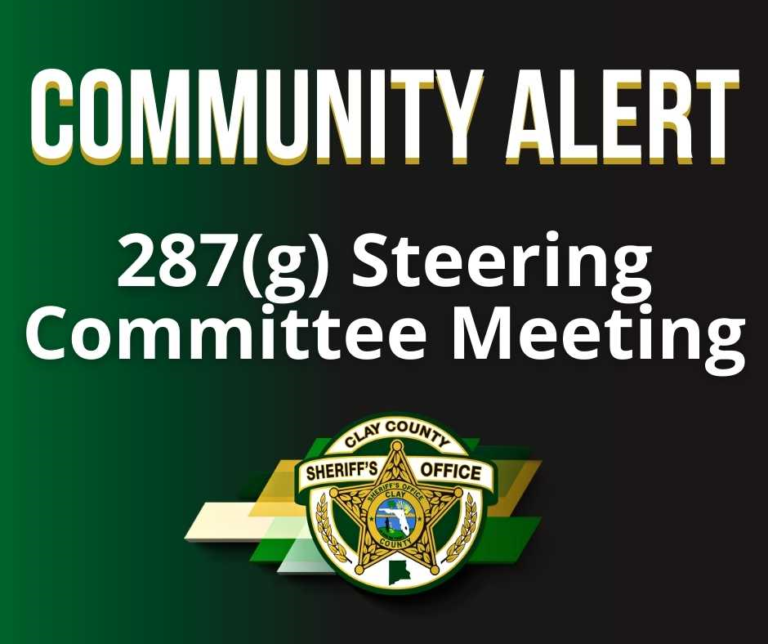The Clay County Sheriff’s Office wants you to stay safe online. There are new scams appearing almost daily by email or on the web. The sheriff’s office offers cyber safety courses for adults and youth.
Topics of Discussion
- Parenting in the Digital Age
- Permanence of Online History
- Security Breaches from Online Communications
- Deception in the Online Community
- Predators/Stalking/Theft
- Consequences of Cyber Bullying
- Dangers of Applications and Websites
- Location Services, Passwords and Detailed Information Awareness
- Sexting and the Legal Ramifications
- Consequences of Ill Behavior and Illegal Activities
- Online Gaming, Identity Theft, Spyware, Malware and Digital Footprints

Internet Safety
Clay County’s young people spend much of their leisure time online. The internet can be a wonderful learning and social tool, but it can also expose unsuspecting children to the criminal element and make them targets for abduction or abuse. We encourage parents to review these simple guidelines with their children.
- DO keep your personal information (last name, password, address, phone number) private.
- DO stop what you are doing and tell a trusted adult if something online makes you uncomfortable.
- DO avoid arguments with online bullies.
- DON’T meet in person with online-only friends.
- DON’T become an online bully by being abusive to others.
- DON’T open email/message or download files from people you don’t know
Identity theft can occur …
- In public places, criminals may engage in shoulder surfing, watching you from a nearby location as you punch in your personal identification number (PIN) or credit card number.
- When you use your debit or credit card at a business that provides open WiFi to customers, criminals can access your information.
- Some criminals engage in dumpster diving, going through your garbage cans or commercial dumpsters to obtain copies of your checks, credit card or bank statements or other records that may bear your name, address or telephone number.
- Criminals may simply steal your wallet or purse.
- Criminals may open up a new credit card account, using your name, date of birth and social security number. When they use the credit card and don’t pay the bills, the delinquent account is reported on your credit report.
- Criminals may pilfer bank statements, credit card statements or pre-approved credit card applications from your mailbox.
Ways to protect your identity
- Dispose of your personal information properly. Shred unwanted copies of credit card receipts and loan applications before you discard them.
- Don’t carry your passport, birth certificate or your social security card with you. Don’t give out your social security number to anyone and don’t put it on your checks.
- Don’t give out any personal information on the phone unless you are absolutely certain it is for a legitimate purpose.
- Obtain a copy of your credit report annually and check it for errors.
- Be aware of skimming devices that are attached to ATM and credit card readers at gas pumps. If it looks as if a device has been attached, alert the bank or store personnel.
- Don’t be bullied. Some scammers will call you acting like someone from a company or bank you do business with. They will try to scare you by telling you about unauthorized withdrawals or purchases. If they ask you for personal information or for money, that is a red flag!
Already a victim of identity theft?
- When dealing with authorities and financial institutions, keep a log of all conversations, including dates, names and phone numbers. Confirm conversations in writing. Send correspondence by certified mail – return receipt requested. Keep copies of all correspondence.
- File a report with your local law enforcement agency and provide as much documented evidence as possible. Obtain a copy of the report and the name and telephone number of your fraud investigator. Provide it to creditors and others who require verification of your case.
- Immediately contact the fraud units of the main credit reporting companies.
- Contact all creditors immediately, with whom your name has been used fraudulently, by phone and in writing. Obtain replacement cards with new account numbers for those that have been fraudulently used. Ask that old accounts be processed as “account closed at consumer’s request.” Carefully monitor your mail and credit card bills for evidence of new fraudulent activity. Report such fraudulent activity immediately to credit grantors.
Social security number misuse
Call the Social Security Administration (SSA) to report fraudulent use of your social security number at (800) 269-0271. The SSA will only change it if you fit the fraud victim criteria. Be sure to order a copy of your Social Security Earnings and Benefits Statement and check it for accuracy. For more information, contact the Federal Trade Commission.





